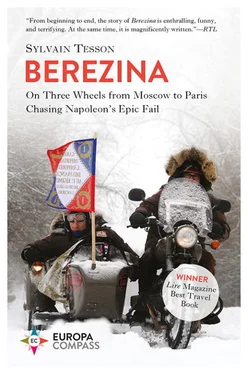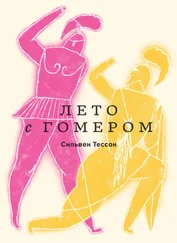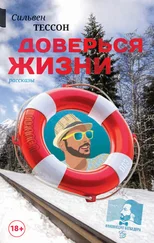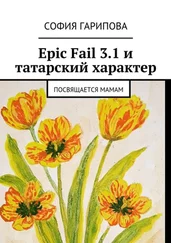How many had listened to Caulaincourt who—almost the only one—worried about the winter, advocated that studded horseshoes be melted down, and clothes be lined? No one. The Grand Squire had even tried to warn the Emperor. “Sire, beware of the trying winter over there.”
“Caulaincourt, you’re already worrying about freezing.”
Napoleon held meteorology in contempt. One day in 1809, when he met Lamarck, who had just laid the foundation stones of this science, he said, “Your meteorology […] is a dishonor to your old age.” The King of Kings, confident in his own star, did not accept that climatic circumstances could get in the way of his destiny. It wasn’t up to the sky to command! On November 1st, 1812, in Vyazma, when the weather allowed for the hope of a milder spell, he told the Prince of Neuchâtel, “The stories about the Russian winters must have only served to scare children.” The geniuses of this world always sport contempt for cosmic laws in proportion with the confidence they place in their own tiny person. The Grande Armée had been the grasshopper, then the cold wind had started to blow…
Night was falling over Russia. There was still no sign of Vyazma’s lights. Trucks were brushing past us and the air pockets caused by their bulk sucked us toward the middle of the road. We were like a toy tossed between the walls of sheet steel. A pothole would have solved all our problems and removed any regrets. We had to fight against the cold, the condensation, the night, the traffic, the snow, and the black ice. And of all the hounds snapping at our rears there was the worst of them: sleepiness. I fought tooth and nail in my helmet so I wouldn’t close my eyes. Speaking of my eyes, blind as a bat, I couldn’t see a thing through the triple protection of my glasses, my mask, and the visor of my helmet. In the beginning, I tried to wipe away the condensation but my muddy gloves left opaque smears on the Plexiglas. Then, hunched on my seat, trying to interpret what I saw to the best of my ability, I decided that Gras and Goisque were peculiar companions. To trust me with their lives—me, who couldn’t make out Serbian tail lights farther than thirty yards away—was one hell of a proof of friendship. Goisque, at least, was aided by his Christian faith, but Gras, who, like myself, believed in nothing but the night and running in the mountains, must have been desperate or, at least, as little attached to his life as a sidecar to the motorbike it’s pulled by.
“Vyazma, six miles” the sign said. We couldn’t complain, really. Does one have a right to complain on a road where men ate one another, horses fell by the thousand then were torn to shreds by ghosts that were left to chew on the leather of their boots? The reason for this journey was precisely to make this nightmare sink deep into our heads in order to hush the inner laments and to wring the neck of this shrew, this repugnant tendency that is man’s true enemy: self-pity. Since our journey along the path of the French Retreat, whenever I’ve found myself on cliffs that were too steep, or in bivouacs that were too cold, I’ve often thought of those poor devils crawling on the icy road, huddled in their rags, fed on rotting tripe, and I’ve swallowed back the phlegm of whining rising to my lips.
How did we get to Vyazma? How did we find ourselves in that little city-center hotel? It was 5°F that night.
“Guys, this is really stupid, you know,” Goisque said. “I know we’ve done some crazy stuff but there, on that road, in the midst of those trucks, with us clinging to that little sidecar and Tesson who can’t see a thing, I mean it’s one of the most dangerous trips of my life.”
And, since we agreed with him, since all three of us had felt the breath of trucks on our necks hissing like the blade of the Grim Reaper, we decided to go and plunge into a bowl of hot borscht in the nearest café.
DAY THREE.
FROM VYAZMA TO SMOLENSK
Our room was like a battlefield. Our clothes were hanging on lines extending from the light fixture to the door, and from the window to the bed. The night before, we’d drunk half a gallon of vodka instead of the intended three small glasses, had come back quite rowdy, and gotten into a friendly fight around midnight. I’d held my own against Cédric’s chunky frame for at least three seconds, but the tackle was enough to smash the closet. We’d gotten back up, started again, and had fun. The curtains were half-torn. The furniture had been knocked over. The table, overturned, was buried under our soaked parkas. The helmets were dripping in the bath tub. A Romani would have been shocked.
At dawn, over a hot coffee and cabbage soup, Vassily calls. The vodka from the night before was digging hollows between my temples. His voice pierced through my brain like a thick drill. “We’re still in Moscow,” he said. “We’re leaving at noon. We had to change the alternators.”
“Hey, guys, we’re getting fed up with this. You’ve got our bags and our stuff! We’re freezing our butts off, and the bike and sidecar are struggling with the three of us on top.”
“Don’t worry, we’ll join you between Vyazma and Smolensk,” he said. “We’re faster than you.”
“It’s been three days you’ve been saying this! I don’t believe you anymore.”
“Western man despairs very soon,” he said.
The weather had gotten milder: 17°F. The sky was blue, the sun a joyful ball above the forest. The bulbs were drops of pearly-gold in the morning hope. The bike started immediately and we took the road to Dorogobuzh with a light heart and an anvil in our heads.
Napoleon had reached Vyazma on October 31st. He stationed there on November 1st and left again at noon on the 2nd. The army that had left Moscow with over one hundred thousand soldiers was down to almost half!
Around us, that morning, the curtains of silver birches alongside the road had a blue glow. The saplings were whipping the lilac air and a pale yellow flow, escaped from the cold light, streaked the snowdrifts on the shoulders. I thought of Chagall and summoned shadows. What did that routing column look like? Like an army of ghosts. But colorful ghosts, in full dress.
Leaving Moscow, more or less bucked up after five months of being stationed in the capital, everyone wanted to bring back to their home country the fruit of his pillage. In his Memoirs , Sergeant Bourgogne makes an inventory of his booty with the innocence of victorious men. He departs, his bag weighed down by a “Chinese woman’s dress made of silk, woven with gold and silver,” a “piece of the cross of the great Ivan,” “a brown woman’s coat with green velvet lining,” as well as two paintings, one of which represented Neptune, the other the Judgement of Paris, a woman’s petticoat, a large collar lined with ermine, and a small Chinese vase… However, as soon as it started getting cold at the end of October, and snowing in Vyazma, these expensive fabrics, silk brocades, and palace hangings were only useful for protecting the numbed limbs and heads of the soldiers, whose “brains were freezing,” according to Bourgogne. And then there were tens of thousands of sergeants, officers and a mixture of civilians—because there were over a thousand craftsmen, actors, shopkeepers, women, and children who had chosen to follow the Grande Armée to escape Russian reprisals—tens of thousands of escapees, decked out in fancy hats they had stuffed with straw, draped in cotton fabrics padded with felt or wool, rolled up in satin canopies they had torn off the wood paneling of a palace, or wrapped in Bukhara rugs held together with silk ribbons.
Thus, they formed a grotesque column where, amid shakos, sabretaches, and regulation hullabaloo, you could glimpse a Russian lady’s cape, a sable, a piece of lace. Captain François, with two bullets in his leg, walked “with boots and worn-out shoes on his feet, a crutch in his hand […] covered in a pink cloak lined with ermine, with the hood over his head.”
Читать дальше












